新概念青少版1B Unit22 Watching the neighbours 课件(共32张PPT)
文档属性
| 名称 | 新概念青少版1B Unit22 Watching the neighbours 课件(共32张PPT) | 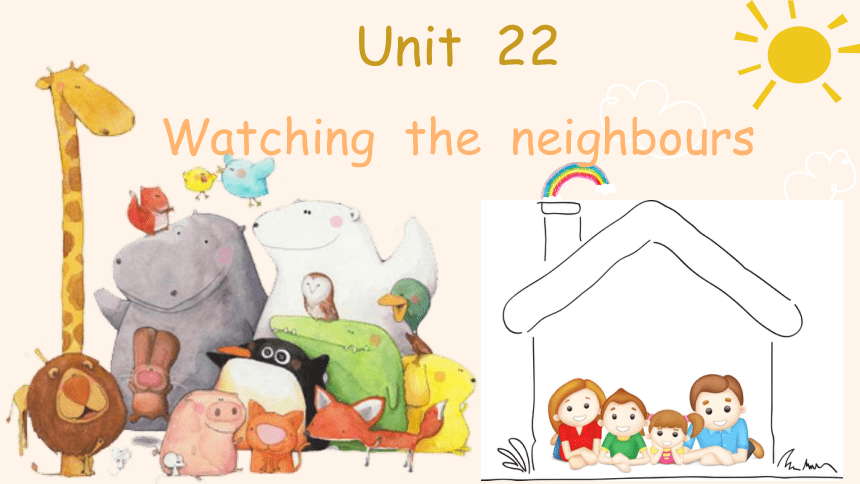 | |
| 格式 | zip | ||
| 文件大小 | 9.8MB | ||
| 资源类型 | 试卷 | ||
| 版本资源 | 新概念英语 | ||
| 科目 | 英语 | ||
| 更新时间 | 2021-10-12 17:07:06 | ||
图片预览


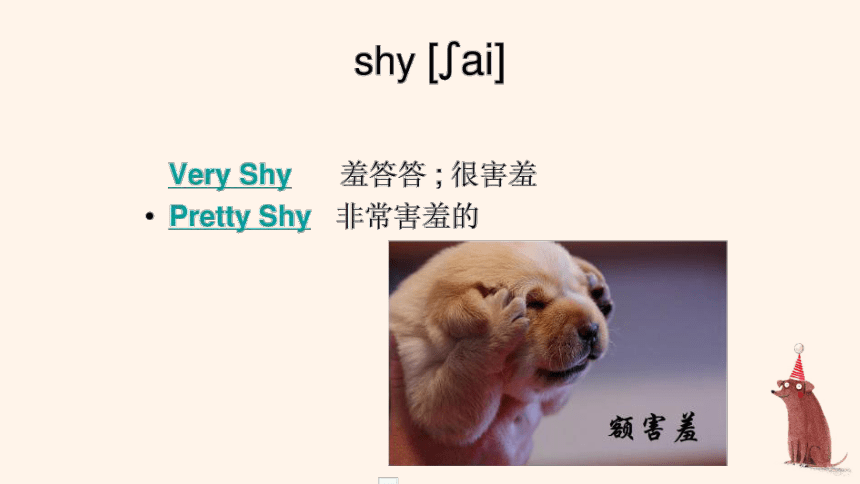
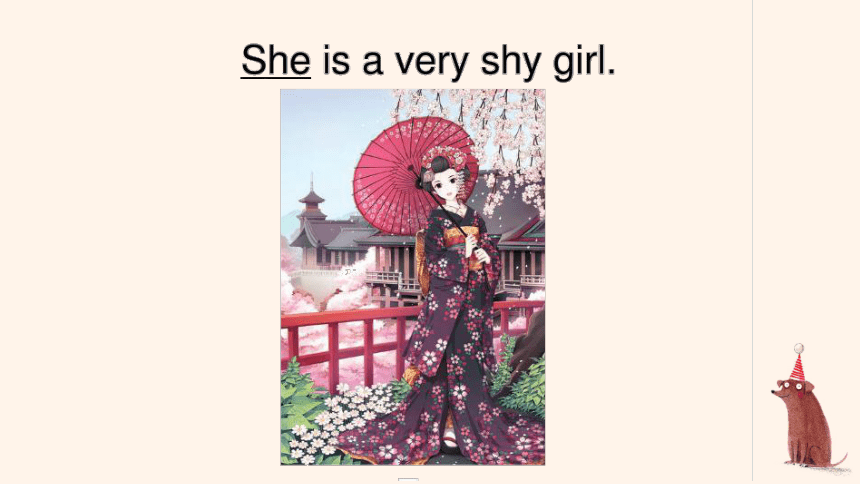
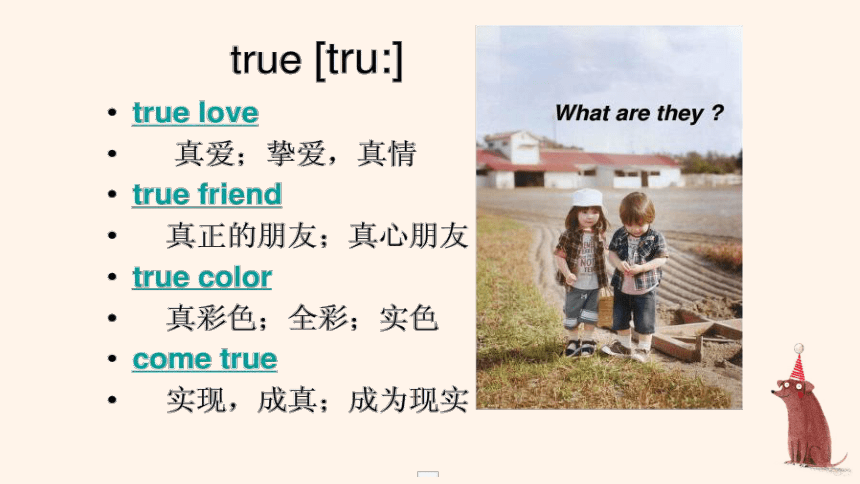
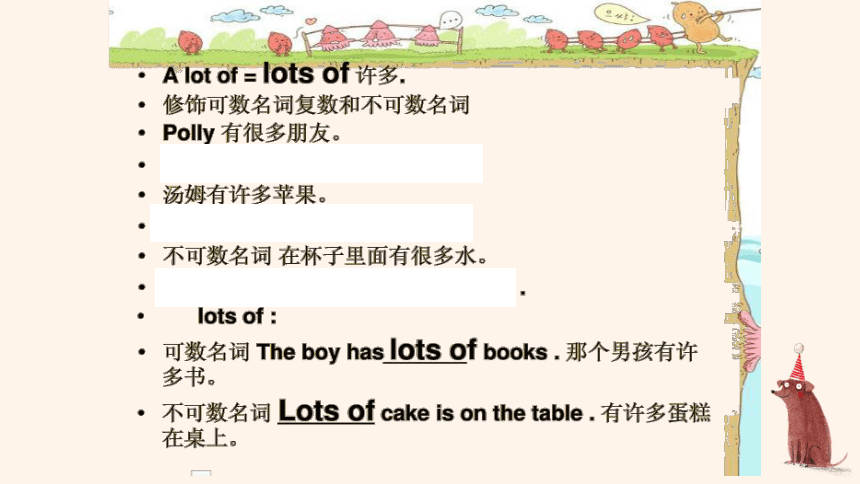
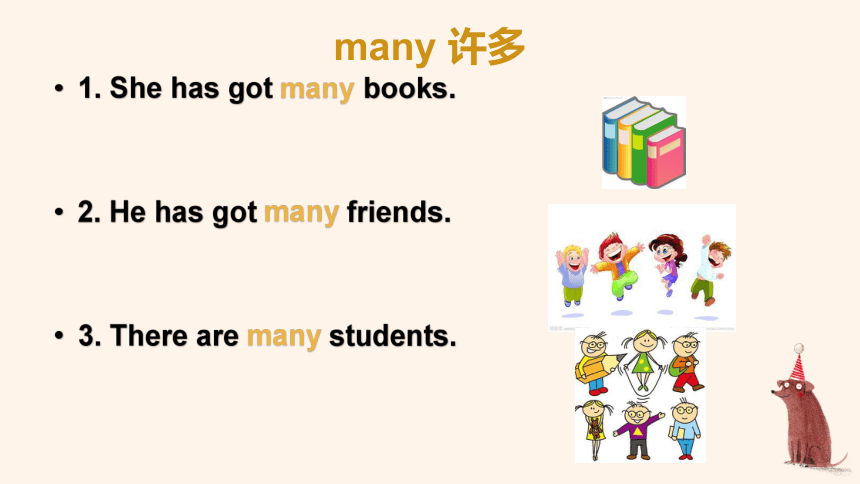
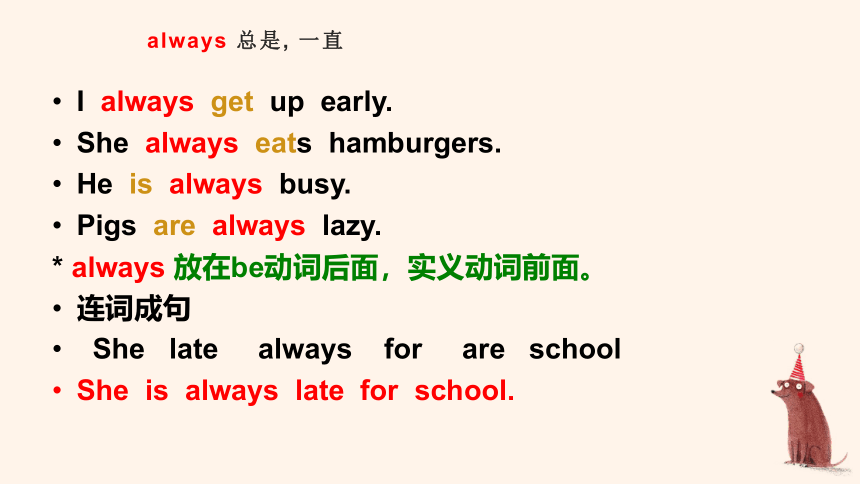
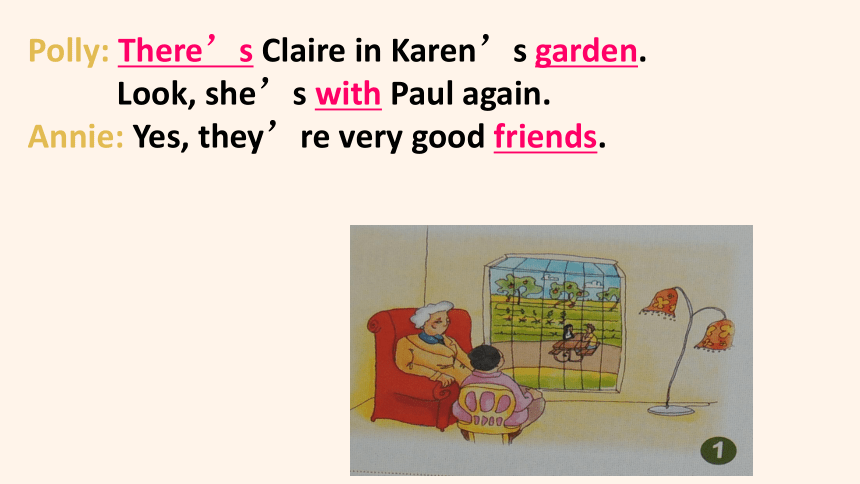
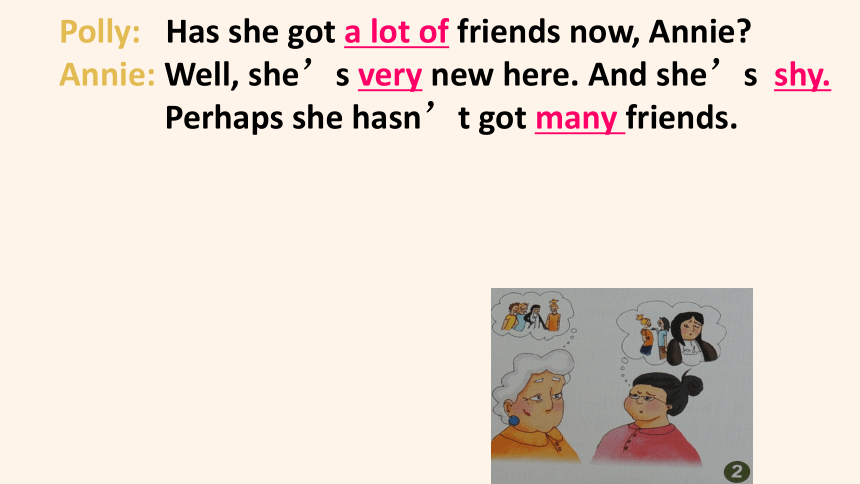
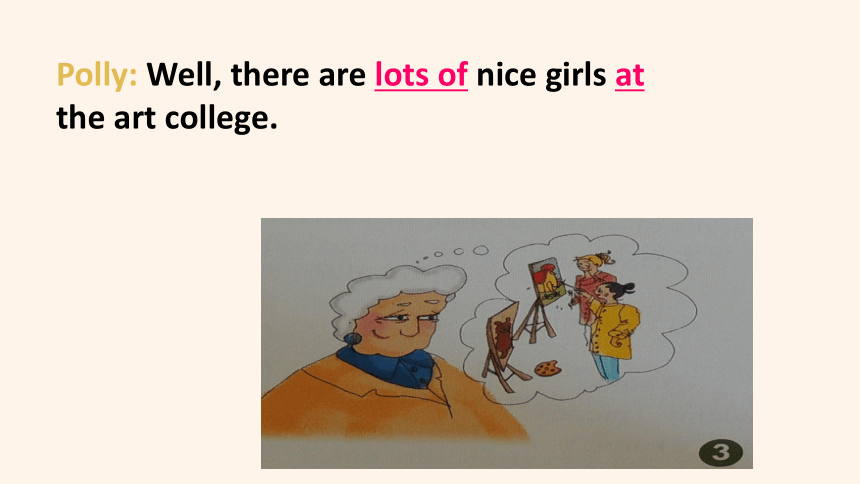
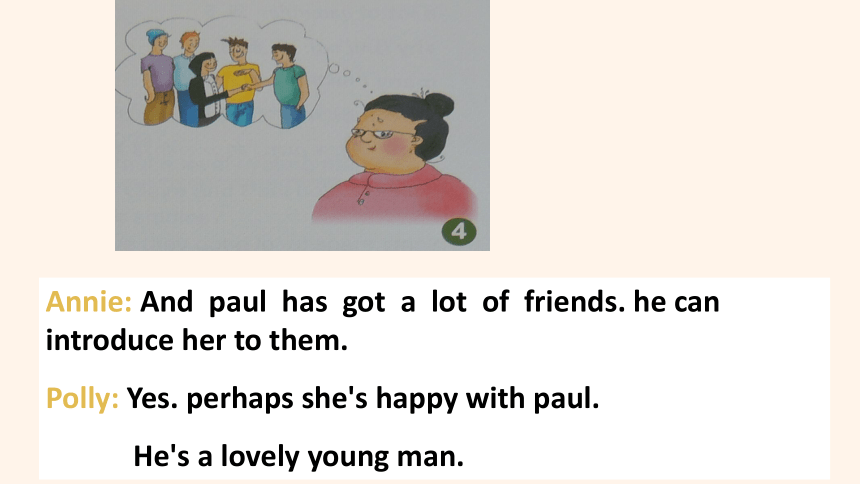
文档简介
(共32张PPT)
Unit 22
Watching the neighbours
Let’s learn the new words P52
a lot of 许多 shy 害羞的,胆小的
many许多 introduce 介绍
to 向 studies 学习
true 真实的 always 总是
many 许多
1. She has got many books.
2. He has got many friends.
3. There are many students.
always 总是, 一直
I always get up early.
She always eats hamburgers.
He is always busy.
Pigs are always lazy.
* always 放在be动词后面,实义动词前面。
连词成句
She late always for are school
She is always late for school.
Polly: There’s Claire in Karen’s garden.
Look, she’s with Paul again.
Annie: Yes, they’re very good friends.
Polly: Has she got a lot of friends now, Annie Annie: Well, she’s very new here. And she’s shy.
Perhaps she hasn’t got many friends.
Polly: Well, there are lots of nice girls at the art college.
Annie: And paul has got a lot of friends. he can introduce her to them.
Polly: Yes. perhaps she's happy with paul.
He's a lovely young man.
Annie: And they're both very busy with their studies. they haven't got a lot of spare time.
Polly: That's ture.
Paul's always busy.
Now tell me about Claire's mother...
Answer the questions
1.Who is in Karen’s garden
Claire is.
2.Is Claire in the garden with Paul
Yes, she is.
3.Has Claire got lots of friends now
No, she hasn’t.
4.Who is shy
Claire is.
5.Are there lots of nice girls
Yes, there are.
Listening and understanding
Polly: There’s Claire in Karen’s garden. Look, she’s with Paul again.
Annie: Yes. They are very good friends
Polly: Has she got a lot of friends now, Annie
Annie: Well, she’s very new here. And she’s shy. Perhaps
she hasn’t got many friends.
通常放在动词短语的最后。
通常表示赞许,用于形容那些在社交中不主动的人。
可与maybe互换使用;用于提出建议或进行试探性的解释。通常放在主语前面或动词短语的最后。
在与have got 和 there are 连用时,a lot of 更常使用。在疑问和否定陈述句中我们用many+可数名词
Listening and understanding:
Polly: Well, there are lots of nice girls at the art college.
Annie: And Paul has got a lot of friends. He can introduce her to them.
Polly: Yes. Perhaps she’s happy with Paul. He is a lovely young man.
表示“可能性”
introduce sb to 名词或代词宾语。
Listening and understanding
Annie: And they’re both very busy with their studies. They haven’t got a lot of spare time.
Polly: That’s true. Paul’s always busy. Now tell me about Claire’s mother…
always 与现在时连用。表示“永久性真理”。在陈述句中放在be的后面。在疑问句中,它放主语的后面。
e.g. Is he always busy
He is always busy with his work.
Pronunciation
[i ] here dear hear near beer clear ear
New words and expressions:
CD CD光碟 video 录像带
DVD DVD光盘 blouse 女士衬衫
jacket 夹克衫 skirt 裙子
magazine 杂志 vegetable 蔬菜
relative 亲戚
Pattern practice
1. A: Paul has got some CDs.
B: He’s got some DVDs, too.
2. A: Paul’s got lots of CDs.
B: Yes, he has, but he hasn’t got many
DVDs.
单数第三人称she/he has got 与any, some, lots of, how many, not many+可数名词复数连用
many几乎从不用在肯定句中,我们更常说的是:he’s got lots of/ a lot of books.
Pattern practice
3. A: Has Paul got any DVDs
B: Yes, he has,
and he’s got lots of CDs, too.
4. A: How many CDs has Paul got
B: lots.
A: And how many DVDs has he got
B: Not many.
回答疑问句Has he/she got… 的缩略式是 Yes, he/she has.
疑问词how many与复数可数名词连用。
How much与不可数名词连用。
Pattern practice
5. A: How many DVDs has Paul got
B: Not many.
A: What about CDs
B: oh, he’s got lots of CDs.
many几乎从不用在肯定句中,我们更常说的是:he has got lots of/ a lot of friends.
Key to written exercises
P56-2
I’ve got some good books in my living-room.
I haven’t got many magazines in my desk.
He’s got lots of friends in his school.
He hasn’t got any videos in his room
She hasn’t got many vegetables in her garden.
We’ve got lots of videos in our living-room.
We haven’t got any old teachers in our college.
She’s got a lot of CDs in her bag.
Key to written exercises
P56-4
Claire is in Karen’s garden. She is with Paul. They are very good friends. Claire is very new here and she is shy. There are lots of nice girls at the art college. Paul has got a lot of friends. He can introduce Claire to them.
Grammar
语法
复习have got 的用法
have got 表示有的意思,用于第一人称,第二人称和第三人称复数。
eg: 1: 我有一本书。
2:你有一些咖啡。
3:我们有一些苹果。
4:你们有一些篮球。
5:他们有一些钱。
变否定,have后加not
Haven’t got
变一般,将have提前,遇到第一变第二
I have got a book.
I haven’t got a book.
Have you got a book
has got 的用法
has got 表示有的意思,主要用于单数第三人称。(he, she, It, 人的名字和称呼)
He
She
It
has got
lots of CDs
some shirts
a hat
eg: 1: 她有许多钱。
2:他有一个新书包。
3:它有许多的食物。
5:我的妹妹有一条新裙子。
Practice
She has got lots of money.
She hasn’t got lots of money.
He has got a new school bag.
He hasn’t got a new school bag.
It has got a lot of hats.
It hasn’t got a lot of hats.
My sister has got a new skirt.
My sister hasn’t got a new skirt.
变为一般疑问句
1.He has got many friends.
Has he got many friends
2.Paul has got lots of books.
Has Paul got lots of books
做肯定和否定回答
1. Has Paul got any cake
肯定.回答;
Yes, he has.
否定回答;
No, he hasn’t
2. Has Claire got any food
Yes, she has. No, she hasn’t.
1. has got 表示(某人)有 (用于主语单三)
e.g. He has got some juice.
否定形式:hasn’t got 没有
e.g. He hasn’t got any juice.
一般疑问句:
Has he got any juice
肯定回答:
Yes,he (主语) has.
否定回答:
No, he(主语)hasn’t.
就划线部分提问
1.Paul has got twenty books .
How many books has Paul got
2. Mary has got some flowers.
How many flowers has she got
3. Alice has got lots of money.
How mauch money has Paul got
Unit 22
Watching the neighbours
Let’s learn the new words P52
a lot of 许多 shy 害羞的,胆小的
many许多 introduce 介绍
to 向 studies 学习
true 真实的 always 总是
many 许多
1. She has got many books.
2. He has got many friends.
3. There are many students.
always 总是, 一直
I always get up early.
She always eats hamburgers.
He is always busy.
Pigs are always lazy.
* always 放在be动词后面,实义动词前面。
连词成句
She late always for are school
She is always late for school.
Polly: There’s Claire in Karen’s garden.
Look, she’s with Paul again.
Annie: Yes, they’re very good friends.
Polly: Has she got a lot of friends now, Annie Annie: Well, she’s very new here. And she’s shy.
Perhaps she hasn’t got many friends.
Polly: Well, there are lots of nice girls at the art college.
Annie: And paul has got a lot of friends. he can introduce her to them.
Polly: Yes. perhaps she's happy with paul.
He's a lovely young man.
Annie: And they're both very busy with their studies. they haven't got a lot of spare time.
Polly: That's ture.
Paul's always busy.
Now tell me about Claire's mother...
Answer the questions
1.Who is in Karen’s garden
Claire is.
2.Is Claire in the garden with Paul
Yes, she is.
3.Has Claire got lots of friends now
No, she hasn’t.
4.Who is shy
Claire is.
5.Are there lots of nice girls
Yes, there are.
Listening and understanding
Polly: There’s Claire in Karen’s garden. Look, she’s with Paul again.
Annie: Yes. They are very good friends
Polly: Has she got a lot of friends now, Annie
Annie: Well, she’s very new here. And she’s shy. Perhaps
she hasn’t got many friends.
通常放在动词短语的最后。
通常表示赞许,用于形容那些在社交中不主动的人。
可与maybe互换使用;用于提出建议或进行试探性的解释。通常放在主语前面或动词短语的最后。
在与have got 和 there are 连用时,a lot of 更常使用。在疑问和否定陈述句中我们用many+可数名词
Listening and understanding:
Polly: Well, there are lots of nice girls at the art college.
Annie: And Paul has got a lot of friends. He can introduce her to them.
Polly: Yes. Perhaps she’s happy with Paul. He is a lovely young man.
表示“可能性”
introduce sb to 名词或代词宾语。
Listening and understanding
Annie: And they’re both very busy with their studies. They haven’t got a lot of spare time.
Polly: That’s true. Paul’s always busy. Now tell me about Claire’s mother…
always 与现在时连用。表示“永久性真理”。在陈述句中放在be的后面。在疑问句中,它放主语的后面。
e.g. Is he always busy
He is always busy with his work.
Pronunciation
[i ] here dear hear near beer clear ear
New words and expressions:
CD CD光碟 video 录像带
DVD DVD光盘 blouse 女士衬衫
jacket 夹克衫 skirt 裙子
magazine 杂志 vegetable 蔬菜
relative 亲戚
Pattern practice
1. A: Paul has got some CDs.
B: He’s got some DVDs, too.
2. A: Paul’s got lots of CDs.
B: Yes, he has, but he hasn’t got many
DVDs.
单数第三人称she/he has got 与any, some, lots of, how many, not many+可数名词复数连用
many几乎从不用在肯定句中,我们更常说的是:he’s got lots of/ a lot of books.
Pattern practice
3. A: Has Paul got any DVDs
B: Yes, he has,
and he’s got lots of CDs, too.
4. A: How many CDs has Paul got
B: lots.
A: And how many DVDs has he got
B: Not many.
回答疑问句Has he/she got… 的缩略式是 Yes, he/she has.
疑问词how many与复数可数名词连用。
How much与不可数名词连用。
Pattern practice
5. A: How many DVDs has Paul got
B: Not many.
A: What about CDs
B: oh, he’s got lots of CDs.
many几乎从不用在肯定句中,我们更常说的是:he has got lots of/ a lot of friends.
Key to written exercises
P56-2
I’ve got some good books in my living-room.
I haven’t got many magazines in my desk.
He’s got lots of friends in his school.
He hasn’t got any videos in his room
She hasn’t got many vegetables in her garden.
We’ve got lots of videos in our living-room.
We haven’t got any old teachers in our college.
She’s got a lot of CDs in her bag.
Key to written exercises
P56-4
Claire is in Karen’s garden. She is with Paul. They are very good friends. Claire is very new here and she is shy. There are lots of nice girls at the art college. Paul has got a lot of friends. He can introduce Claire to them.
Grammar
语法
复习have got 的用法
have got 表示有的意思,用于第一人称,第二人称和第三人称复数。
eg: 1: 我有一本书。
2:你有一些咖啡。
3:我们有一些苹果。
4:你们有一些篮球。
5:他们有一些钱。
变否定,have后加not
Haven’t got
变一般,将have提前,遇到第一变第二
I have got a book.
I haven’t got a book.
Have you got a book
has got 的用法
has got 表示有的意思,主要用于单数第三人称。(he, she, It, 人的名字和称呼)
He
She
It
has got
lots of CDs
some shirts
a hat
eg: 1: 她有许多钱。
2:他有一个新书包。
3:它有许多的食物。
5:我的妹妹有一条新裙子。
Practice
She has got lots of money.
She hasn’t got lots of money.
He has got a new school bag.
He hasn’t got a new school bag.
It has got a lot of hats.
It hasn’t got a lot of hats.
My sister has got a new skirt.
My sister hasn’t got a new skirt.
变为一般疑问句
1.He has got many friends.
Has he got many friends
2.Paul has got lots of books.
Has Paul got lots of books
做肯定和否定回答
1. Has Paul got any cake
肯定.回答;
Yes, he has.
否定回答;
No, he hasn’t
2. Has Claire got any food
Yes, she has. No, she hasn’t.
1. has got 表示(某人)有 (用于主语单三)
e.g. He has got some juice.
否定形式:hasn’t got 没有
e.g. He hasn’t got any juice.
一般疑问句:
Has he got any juice
肯定回答:
Yes,he (主语) has.
否定回答:
No, he(主语)hasn’t.
就划线部分提问
1.Paul has got twenty books .
How many books has Paul got
2. Mary has got some flowers.
How many flowers has she got
3. Alice has got lots of money.
How mauch money has Paul got
同课章节目录
- Unit 16 On the London Eye
- Unit 17 Smile,please!
- Unit 18 Men can cook,too!
- Unit 19 You must eat!
- Unit 20 What a surprise!
- Unit 21 Breakfast blues
- Unit 22 Watching the neighbours
- Unit 23 An expensive camera
- Unit 24 A light dinne
- Unit 25 The weekend shopping
- Unit 26 A self-service restaurant
- Unit 27 Toothache
- Unit 28 Every day is different!
- Unit 29 Many happy returns of the day!
- Unit 30 An internation event
